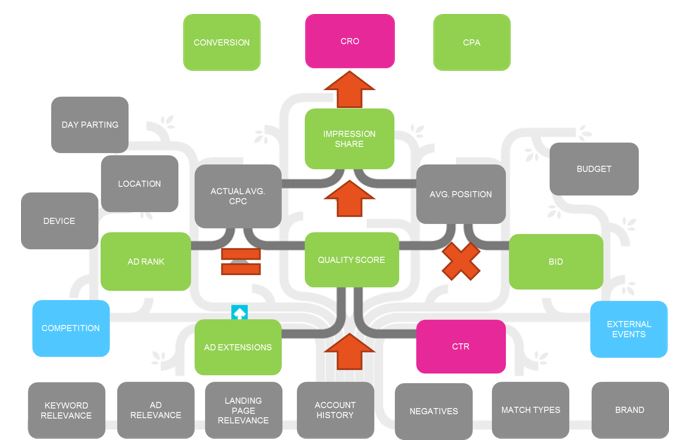At Let’s Do Digital this year, myself and Adido paid search maestro Suzana Bulearca, presented our theories on the three life stages of a PPC account for paid search success.
Having extensively researched and implemented many PPC management techniques over the years we felt that these three life stages: new, growing and mature, provided a great concept from which to focus attention, effort and reward for anyone managing a PPC account.
Our talk set the scene by taking everyone back to 2000 when the Google search results offered up very little in terms of ad competition (this was the launch of Google paid ads) and visually it was quite a simple, but untidy landscape.
Moving on to 2005 and 2010, the search results became more varied, the beginnings of “best practice” were evident; and new Google ad features like PLAs, Google checkout buttons and site links appeared.
Now, in 2015, our search result pages display a different view each time, especially across industries. You’ll find Google compare features, Google shopping ads, enhanced site links, callout extensions, 3rd party reviews etc… the landscape is cluttered and awash with variety. As a PPC manager it’s quite a daunting, but also a distracting landscape.
The metrics and features that are prevalent in this sector were illustrated using this diagram. These are some of the elements which are in our control.

Whilst from day one all of these elements can be considered there are just too many to effectively optimise. No-one is blessed with the luxury of time in this industry, and tackling all of these would require a lot of it! So, enter the three stages of a PPC account…
1) the *new* (or unloved/ignored) account
These accounts are ones which are either brand new, have had up to 6 months’ worth of activity in a relatively restricted budget/keyword scope environment or are old accounts which have not received the right attention, time or budget needed to grow.
If you think about PPC like building a house, then, this is the foundation stage.
Key questions to ask at this stage are:
- What products / services do you want to promote – can you prioritise them?
- How much are you prepared to invest in PPC and what is your target cost per conversion?
- Who are your competitors (for your chosen search terms, not just your direct business competitors)
- What message do you want to say, and does it set you apart from the rest?
- Where will you send your PPC traffic?
The three elements to concentrate your efforts on are:
- Getting the setup right – settings, tight keyword themes and core attributes (match type, negatives, device bids)
- Knowing the user journey – the right messaging and the right landing page. And don’t forget mobile adjustments – both ads and pages.
- Brand bidding considerations – knowing when & why to bid on your brand term, but avoid competitor brand bidding (at this stage). Our simple approach is to bid when your brand is under threat or your industry is expensive for generic terms.
2) the growing account
An account, depending on industry, performance, or business investment in the channel could reach this stage after one month of activity or after years of being stuck in the new account phase. These accounts can take advantage of the 101 opportunities to grow where the achievement potential is steep, but unless you’ve got a solid foundation already, you could run the risk of wasting time and money if you venture into this stage too early. You will care more about volume rather than return on investment at this stage, and as long as you can see a positive business impact somewhere the world is your oyster.
This is the core building stage of your “house.”
Key questions to consider at this stage are:
- Where do I see PPC’s role in my business in the next 12 – 24 months?
- How much am I prepared to invest in this channel?
- What is my breakeven point?
- Can I invest to diversify my channel portfolio and generate alternative avenues for growth?
The techniques for growth are:
- Max out volume – have you checked your impression share lately? If it’s not near 100% you could be losing out on the most important impressions.
- Find the optimum settings – avg. position, time of day, day of week, device behaviours all vary. Knowing where to concentrate to get the best return is vital.
- Keyword expansion – go outside of the core set of keywords. There are plenty of keyword research tools to help you do this.
- Test & refine your ads & landing pages – have a structured plan, be patient and always be willing to seek for a better version of what you’ve got.
- Diversify – consider other search engines, other platforms (like LinkedIn or Facebook ads), YouTube ads or Display advertising. Each of these activities can elevate your brand recognition, drive new traffic and potentially create new demand in search.
3) the mature account
These accounts are ones which have been active in the PPC landscape for ages and have seemingly reached a plateau whereby they’ve exhausted the “big wins”. These accounts have experienced the expansions and the hype, but now their industry and/or their account is so mature and well established that there aren’t many ground breaking things to be done. You know (very well) who your search competitors are, what they’re doing, what works best for your account and how your customers search. At this stage your focus should be on outsmarting your competition, squeezing every little efficiency from your keywords and achieving marginal gains.
This is the stage which can be very frustrating as you’ll be spending a lot of time analysing and making decisions which deliver very little extra growth or return, yet each mini cost saving or additional click improves your ROI. If you were to neglect your account at this stage you could very quickly find yourself at the bottom of the results with an expensive recovery on your hands.
Welcome to the “renovation stage,” characterised by these questions:
- How can I squeeze more volume from a mature account or industry?
- How can I beat my competitors?
- Is this the best use of my budget? The right channel, right amount and right time?
- What refinements can I make which keep me the leader in my search environment?
The activities to focus on at this stage are:
- Account structure review – don’t be afraid to go back to the beginning, and with wealth of data available you may decide to organise your account slightly differently to better control the elements which matter most.
- Reconsider terms which may have been paused or discarded along the way – search behaviour is constantly changing. Just because something works really well now, doesn’t mean to say there isn’t a challenger in the midst to overtake it. Keep revisiting terms.
- Competitor intelligence – keeping an eye on your competitors gets really hot at this stage – the slightest competitive advantage could make all the difference in a mature market. If you haven’t already, make Adwords’ auction insights your new best friend.
- Complex bid adjustments – bid layering features have expanded to audiences so you can bid smarter for the people you really really want. The volume drops, but the quality should improve as a result.
- Automation – we’re not a great lover of automating in the new and growth stages, but with the right analysis and insight automated tools can help squeeze that tiny bit more out of your account whether it’s volume or cost efficiency. There are plenty of techniques to use, but data sufficiency is key.
- Radical testing – sometimes subtle changes just don’t have the desired positive movement or you may have tweaked as far as you can go. Now is the time to be bold, and make some really significant amends to your landing pages or website.

- Maximising profitability – mature accounts usually focus on profitability rather than volume. You know what volume’s available, now you want to get it for the cheapest cost possible. Analysing your account to find the tipping point for efficiencies or determining incremental costs become key data tasks.
Finally, regardless of what stage your account is at, it’s important to make sure your eye is always on the PPC ball.
If your eye is off the ball for even a short while, you might find your competitors hit you in the face when you’re least expecting it. Many people think they’ve reached a good and comfortable stage, so they become complacent and maybe even stop investing time in optimisation and just let it run. Then they start panicking when suddenly the volume drops, the profit drops and the brand plunges into collective forgetfulness. WHY? Because all this time, the world is changing, Google is changing, competitors don’t stand still, technology evolves, people change. Losing sight of your account could put your account into a more uncomfortable position quicker than you thought, and then guess what – it takes a lot of effort, time and money to recover, more than it would have taken to just maintain and evolve.
As you’ll hopefully have concluded, there is plenty to be getting on with here, it’s not an exhaustive list by no means, but with so many opportunities, it can often be hard to know which ones to concentrate on, when and why. So hopefully these three stages have given you some context and focus.




